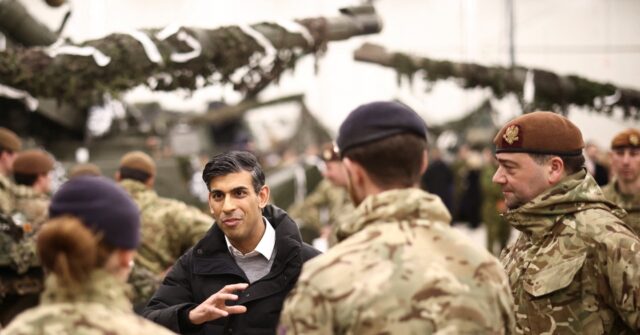

British Prime Minister Rishi Sunak pledged that the United Kingdom will become the first state to supply Ukraine with “longer-range weapons” to use in its war with Russia.
In comments made on Saturday at the Munich Security Conference in Germany, Rishi Sunak said that the West must “help Ukraine to shield its cities from Russian bombs and Iranian drones and that’s why the United Kingdom will be the first country to provide Ukraine with longer-range weapons.”
The British premier went on to say that his government is working with other NATO allies to “give Ukraine the most advanced air defence systems and build the air force they need to defend their nation.”
“[The United Kingdom] is ready to help any country to provide Ukraine planes they need today but we must also train Ukrainian pilots to use advanced jets,” he said.
This escalation comes at a precarious moment for Ukraine’s Western backers, with U.S. Secretary of State Antony Blinken expressing concern that Communist China is considering graduating from “providing rhetorical, political, diplomatic support to Russia” to “providing lethal support to Russia” — a move which would have “serious consequences” for Sino-American relations.
“Never forget who’s the real threat to the world,” a Chinese government spokesman wrote amid the invasion of Ukraine, sharing an infographic sarcastically entitled “USA Bombing List: The Democracy World Tour” listing military interventions https://t.co/7OCRyth6ry
— Breitbart London (@BreitbartLondon) February 27, 2022
Over the past year, the British government has sent nearly £4 billion to Ukraine in aid, £2.3 billion of which has come in the form of weapons, ammunition, or other military equipment.
Following Ukrainian president Volodymyr Zelensky’s visit to London earlier this month, Downing Street said that it was actively considering shipping fighter jets and long-range missiles to the war-torn country.
The two types of long-range missiles reportedly under consideration are the 150-mile range Harpoon high-explosive anti-ship missile and the 350-mile range deep penetration Storm Shadow cruise missile. According to Ukrainian defence sources speaking to The Times of London, Kyiv would use such weaponry to expand the current conflict by launching an assault on the Crimean peninsula, which Russia annexed from Ukraine in 2014.
It is also conceivable that British long-range missiles could be used to wage attacks on Russia proper — a move that could see the localised war transform into a global conflict.
The UK will be the first country to give Ukraine longer-range weapons, says Rishi Sunak.
Speaking at the Munich Security Conference, the PM called on world leaders to “double down on military support.”https://t.co/IYjq6lCRtf pic.twitter.com/7IdvX7jewQ
— Sky News (@SkyNews) February 18, 2023
In addition to doubling down on sending weapons and equipment to Ukraine, Sunak said that NATO should consider creating a “new charter” in its alliance agreement at the upcoming meeting in Vilnius, Lithuania in order to “help protect Ukraine from future Russian aggression”.
Earlier this month, Sunak and Zelensky signed a document dubbed the London Declaration, in which Britain recommitted to its stated stance of supporting Ukrainian admission into the NATO alliance — a move that has been cited as one of the chief motivating factors for the invasion of the country by the Kremlin, which has said that having NATO expand onto its doorstep is a “red line”.
Nevertheless, the declaration states that “[t]he UK has continued to lead the way in support for Ukraine to defend itself including anti-tank weapons and tanks. Our military support to Ukraine is enduring. UK support will continue to contribute across all three domains; Land, Air, Sea.”
So far, there has been little discussion of actually seeking an end to the war through peace negotiations at the Munich summit, which will conclude on Sunday. Appearing before the conference on Friday, German Chancellor Olaf Scholz said that the West must prepare for a “long war” as he called on allies to supply Ukraine with more tanks, weaponry, and ammo.
The German leader was followed by French President Emmanuel Macron, who despite being an early proponent of peace negotiations with Moscow said in Munich that now is “not the time for dialogue”, adding that Western powers must aid Ukraine in launching a counter-offensive against Russia in order to have a “credible” position at the negotiating table.
The prospect of a peace deal was also diminished this week by comments from President Zelesnky, who stated that he would not accept any agreement if it involved territorial concessions to the Russians — a position that will likely serve as a non-starter for Moscow.
‘Nothing Is Off the Table’ — Sunak Considering Sending Fighter Jets to Ukraine amid Pressure from Boris and Zelenksyhttps://t.co/W4VTolVi2q
— Breitbart London (@BreitbartLondon) February 8, 2023
Follow Kurt Zindulka on Twitter here @KurtZindulka




